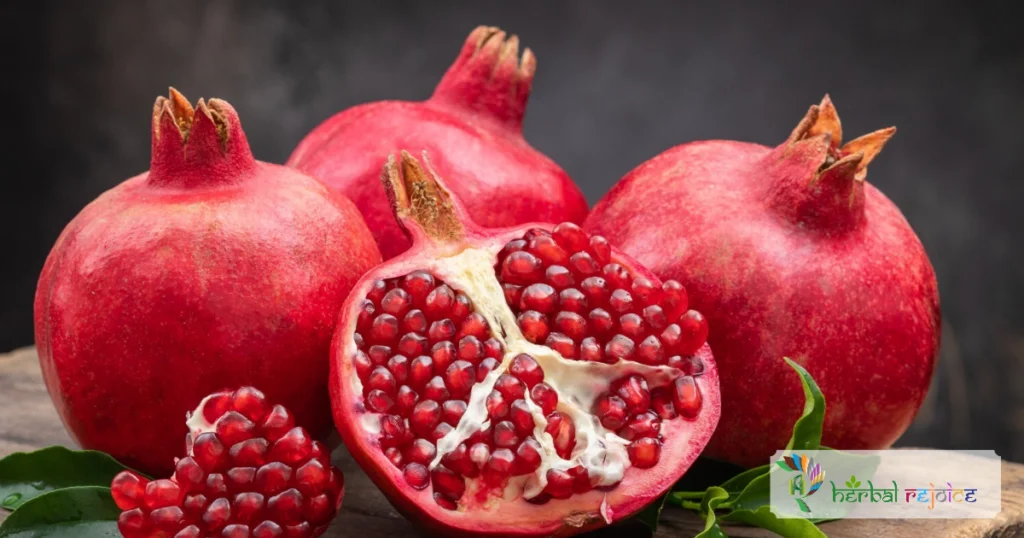Introduction:
Pomegranate, scientifically known as Punica granatum Linn., belongs to the family Punicaceae. It is native to Iran but is cultivated throughout India. Known by various names in different languages such as English, Ayurvedic, Unani, and Siddha/Tamil, this fruit offers numerous health benefits and has been used in traditional medicine for various ailments such as diarrhea, dysentery, colitis, dyspepsia, and uterine disorders.
Medicinal Uses and Health Benefits Of Pomegranate
1. Astringent and Digestive Benefits:
The rind of the pomegranate fruit possesses astringent and digestive properties. It is commonly used to treat diarrhea, dysentery, colitis, dyspepsia, and uterine disorders.
2. Stomatitis Treatment:
The leaf of the pomegranate tree is recommended by The Ayurvedic Pharmacopoeia of India for the treatment of stomatitis, a condition characterized by the inflammation of the mouth and lips.
3. Cooling and Antiemetic Properties:
Fresh pomegranate juice acts as a refrigerant, cools the body, and exhibits antiemetic properties. It is often given as an adjuvant treatment for diarrhea, dyspepsia, biliousness, stomach inflammations, palpitations, excessive thirst, and fevers.
4. Anthelmintic and Febrifuge Effects:
The bark of the pomegranate stem and root has anthelmintic properties and is used as a febrifuge. It is commonly given for night sweats.
5. Antidiarrheal and Bronchitis Treatment:
Both the rind of the fruit and the bark of the stem and root have antidiarrheal properties. The powdered flower buds of the pomegranate are used in the treatment of bronchitis.
Chemical Composition Of Pomegranate
Pomegranate contains various compounds that contribute to its medicinal properties. The dried fruit rind contains up to 26% tannin, while the stem bark contains 10–25%, the root bark contains 28%, and the leaves contain 11% tannin.
The rind also contains an ellagitannin called granatin B, while the leaves contain granatins A and B and punicafolin. Other compounds found in pomegranate include punicalagin, punicalin, ellagic acid, pentose glycosides of malvidin and pentunidin, and malvidin pentose glycoside.

Health Benefits Of Pomegranate
1. Hypoglycemic Activity:
Extracts of the pomegranate fruit rind showed significant hypoglycemic activity in mildly diabetic rats. This suggests that pomegranate may be beneficial in managing blood sugar levels.
2. Antibacterial and Antimicrobial Properties:
Extracts of the pomegranate fruit, including the whole fruit, the root, and the flower, have exhibited high antibacterial activity against various pathogens such as Micrococcus pyogenes var. aureus, E. coli, Pseudomonas aeruginosa, and intestinal pathogenic bacilli. These properties make pomegranate a potential natural remedy for combating bacterial infections.
3. Antitubercular Potential:
Aqueous extract of the pomegranate root was found to inhibit the activity of Mycobacterium tuberculosis. This suggests that pomegranate could potentially be used in the treatment of tuberculosis.
4. Hypolipidemic Activity:
Proanthocyanidins found in pomegranates have shown hypolipidemic activity. They enhance the resistance of the vascular wall and prevent the penetration of cholesterol into atherogenic lipoproteins. This property makes pomegranate beneficial for maintaining healthy cholesterol levels and cardiovascular health.
Conclusion:
Pomegranate, also known as Punica granatum Linn., is a fruit with numerous health benefits. It is used in traditional medicine to treat various ailments such as diarrhea, dysentery, colitis, dyspepsia, and uterine disorders.
The fruit, stem, root, and flower parts of pomegranate contain several compounds with medicinal properties, including antibacterial, hypoglycemic, and hypolipidemic activities. Incorporating pomegranate into one’s diet may contribute to overall health and well-being.
Frequently Asked Questions(FAQs)
What are the medicinal uses of pomegranate?
The medicinal uses of pomegranate include treating diarrhea, dysentery, colitis, dyspepsia, and uterine disorders.
What is pomegranate recommended for in Ayurvedic medicine?
Pomegranate leaves are recommended for the treatment of stomatitis, a condition characterized by inflammation of the mouth and lips.
How does pomegranate juice benefit the body?
Fresh pomegranate juice acts as a refrigerant, cools the body, and exhibits antiemetic properties. It is often given as a treatment for diarrhea, dyspepsia, and stomach inflammations.
What properties does the bark of the pomegranate tree have?
The bark of the pomegranate stem and root has anthelmintic properties and is used as a febrifuge. It is commonly given for night sweats.
How can pomegranate help with bronchitis?
The powdered flower buds of the pomegranate are used in the treatment of bronchitis.
What compounds are found in pomegranate?
Pomegranate contains compounds such as tannins, ellagitannin, punicalagin, punicalin, ellagic acid, and pentose glycosides.
Does pomegranate have any hypoglycemic activity?
Yes, extracts of the pomegranate fruit rind have shown significant hypoglycemic activity, suggesting it may help manage blood sugar levels.
What antibacterial properties does pomegranate have?
Extracts of pomegranate fruit, root, and flower have exhibited high antibacterial activity against pathogens like E. coli and Pseudomonas aeruginosa.
Can pomegranate be used as an antimicrobial agent?
Yes, pomegranate extracts have shown antimicrobial activity against pathogens such as Micrococcus pyogenes var. aureus and intestinal pathogenic bacilli.
Is pomegranate beneficial for treating tuberculosis?
Pomegranate root extract has been found to inhibit the activity of Mycobacterium tuberculosis, suggesting potential use in tuberculosis treatment.
What is the hypolipidemic activity of pomegranate?
Proanthocyanidins found in pomegranates have shown hypolipidemic activity, promoting healthy cholesterol levels and cardiovascular health.
How can pomegranate contribute to overall health and well-being?
Incorporating pomegranate into one’s diet can provide various health benefits, including its antibacterial, hypoglycemic, and hypolipidemic properties.
Can pomegranate help with digestive issues?
Yes, pomegranate is known for its astringent and digestive properties, making it useful in treating conditions like diarrhea and dyspepsia.
Does pomegranate have any cooling effects on the body?
Yes, fresh pomegranate juice acts as a refrigerant and helps to cool the body.
Is pomegranate effective for treating fevers?
Yes, the bark of the pomegranate stem and root has febrifuge properties and is commonly used to treat night sweats.
Does pomegranate have any antidiarrheal properties?
Both the fruit rind and the bark of the stem and root have antidiarrheal properties, making them effective in treating diarrhea.
How does pomegranate benefit cardiovascular health?
The hypolipidemic activity of pomegranate helps maintain healthy cholesterol levels and enhances the resistance of the vascular wall.
Can pomegranate help with treating mouth and lip inflammation?
Yes, pomegranate leaves are recommended for treating stomatitis, which is characterized by inflammation of the mouth and lips.
What compounds are responsible for the antibacterial activity of pomegranate?
Compounds such as tannins, ellagitannin, and pentose glycosides found in pomegranate contribute to its antibacterial properties.
Can pomegranate be used as a natural remedy for bacterial infections?
Yes, the antibacterial properties of pomegranate make it a potential natural remedy for combating bacterial infections.


